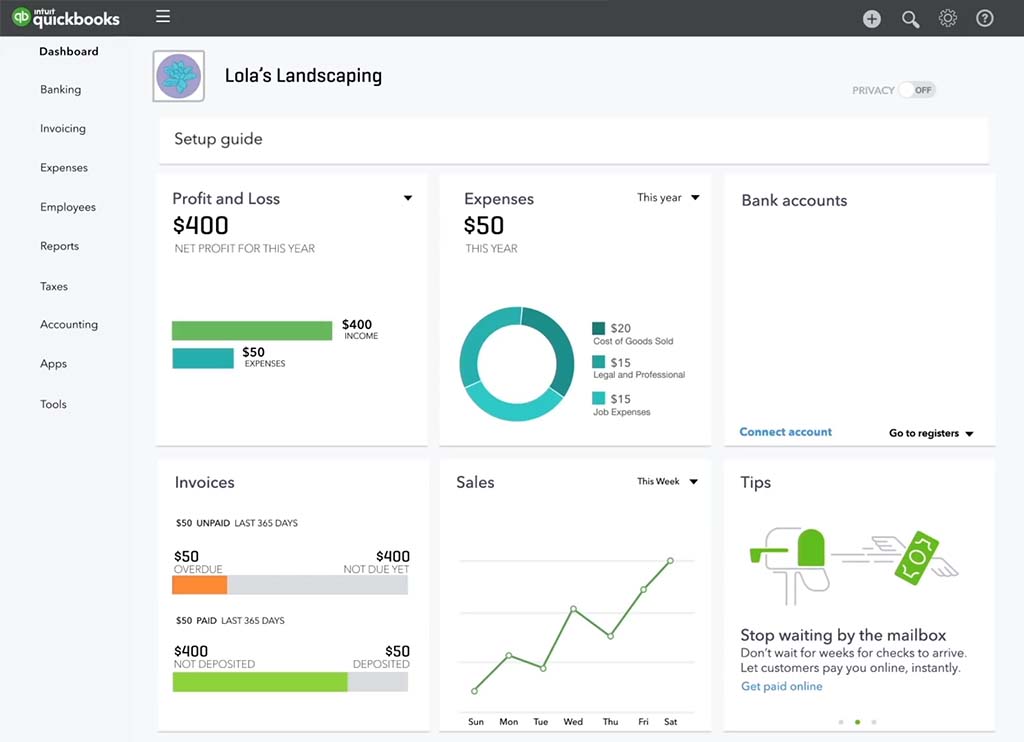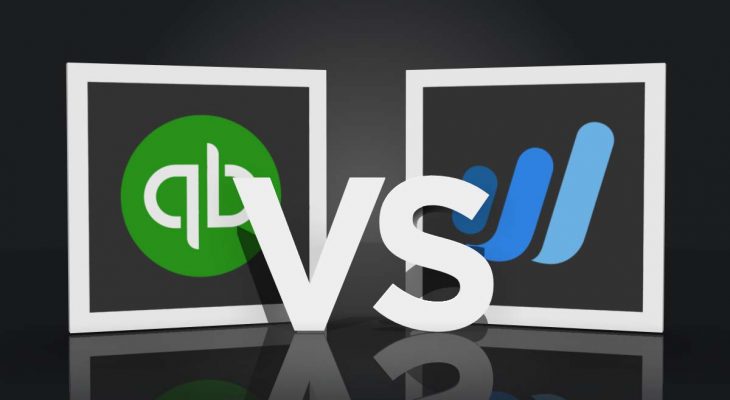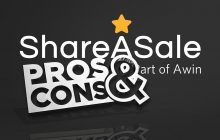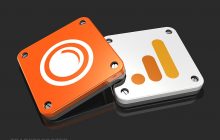Every now and then I lean back in my chair and reminisce about the good old days. Summer evenings playing outside with the neighbor kids, my first girlfriend in elementary school (it was more like an awkward crush actually), and…manually keeping track of every expense so that I didn’t get screwed come tax time. Life was pretty good back then, except for the part about managing business expenses. Accounting software simply didn’t exist, and we sure as heck didn’t have the luxury of comparing things such as Wave vs. QuickBooks.
Fast forward to the present, and I (a user of both Wave and QuickBooks Self Employed) feel like I’m living in a glorious time where this kind of software exists to help keep my business finances in check. Both are incredibly powerful accounting tools, and either one will do a fantastic job of helping you make your life a lot easier come tax time. However, this is a Wave vs. QuickBooks review, so if I had to pick one, it would be QuickBooks.
Why I prefer QuickBooks Self Employed over Wave Financial
I’ll get into detailed list of all the things that QuickBooks Self Employed has that Wave doesn’t (and vice versa) in just a moment, but the big thing for me is that I simply feel like I trust Intuit (the company behind QuickBooks) more.

Never mind the fact that Intuit had been in business for 26 years before Wave Financial launched in 2009. I’m simply not comfortable with the way that Wave hides it’s true monthly cost and tries to lure users in with “free” subscription plans (that are anything but free). That just feels slimy to me and I can’t help but wonder what other kinds of things they are hiding as well.
So yeah. Even before digging into the meat of this Wave vs. QuickBooks comparison, I’m very boldly claiming that I prefer QuickBooks (be sure to read my full review of QuickBooks Self Employed for more info). Nothing will change my mind either, since it’s a brilliantly designed software package which makes being self employed so much easier than it would be if it didn’t exist. Yes, I could probably get by using only Wave and their suite of products, but there are some specific things about it that I don’t like:
- Invoices are free, but payments are pay-per-use. I don’t like the idea of not knowing how much my subscription is going to cost each month.
- Support is worse compared to QuickBooks. It’s not bad, but it usually takes longer to get a response.
- When comparing the mobile apps of both Wave vs. QuickBooks, I prefer QuickBooks due to simplicity and a better list of features.
- Wave is more segmented than QuickBooks Self-Employed. There are separate apps for reciepts and invoices, which is odd to me. Shouldn’t these be in one app?
I’ll get into each of these bullet points in greater detail by talking about all the things that these accounting software packages do (and don’t do) well.
Things that both Wave and QuickBooks do very well
When it comes right down to it, the Wave vs. QuickBooks comparison is a lot closer than I’m making it out to be. Both are really incredible productivity tools for the self employed, and either one is going to make your life easier. You really can’t go wrong with either one. For example:
- Both QuickBooks and Wave allow you to create invoices with just a few clicks
- Both will track expenses (and income) automatically so you don’t have to do anything
- Both will generate yearly (and quarterly) expense and income reports – which are a lifesaver when it comes time to do taxes
- Also a lifesaver is the fact that both will help you keep track of expenses than can (and can’t) be deducted for tax purposes
Another thing that I like about both Wave and QuickBooks is that both platforms are rock solid. What I mean by that is I haven’t personally experienced downtime or system interruptions with either since I started using them last year.
Things that both Wave and QuickBooks don’t do very well
I’ve already mentioned segmentation of apps as a negative point of Wave, but if I’m being honest in this Wave vs. QuickBooks comparison, Intuit is guilty of that as well (but in a slightly different way). I just wish both of these companies would make our lives easier by streamlining thier product offerings to “personal” and “business”. That’s it. That’s all we need. It was really annoying to have to spend the time to figure out which sub-product I needed when I was getting started with both for the first time.
For example, there are 5 QuickBooks apps currently available on the Apple App Store:
- QuickBooks Self-Employed
- Quickbooks Accounting
- QuickBooks Payroll
- QuickBooks GoPayments
- QuickBooks Connect
In comparison, Wave Financial is offering the following apps:
In the Wave vs. QuickBooks app comparison, it seems as if Wave is more organized, right? Wrong! The problem with the Wave suite of apps is that they aren’t as functional as it’s QuickBooks counterparts. However, both are equally guilty of spreading the services they offer out over several repetitive apps which can be confusing (and overwhelming) for new users.
Another thing both services are lacking is easy acesss to professional accountants (which is a nice thing to have at your disposable when growing a business and managing income and expenses). If you want to talk to a live person about tax planning and other important issues, they will charge you a mighty sum for it. You’re far better finding someone local to you to guide you through the difficult stuff.
2 ways Wave is better than QuickBooks
The Wave suite of apps and services is well positioned to topple QuickBooks someday (far) in the future, but it’s going to take decades IMHO. That being said, they seem to be doing a lot of really good things even better than their competition. Here are a few examples:
The youth and energy of a startup
One of best things about Wave Financial is that they are still a relatively young company with an aggressive “startup” feel to it. This is really nice because it’s easy to feel the energy behind this company, and it shows with the frequency of new features (and bug fixes) that are rolled out on a regular basis.
There really isn’t much of a comparison when it comes to Wave vs. QuickBooks in terms of agility and the desire to make waves (pun intended). Intuit / QuickBooks is a much more mature and established brand who is less willing to take chances and do whatever it takes to make the customer happy. Wave Financial is still young (and small) enough to to change direction as needed.
Simple web interface / UI
As an ex User Experience designer (fun fact: I quit that job to blog full time one year ago), I actually prefer the slightly more featured QuickBooks user interface (UI). However, when it comes down to ease of use for new users, this Wave vs. QuickBooks review is going to skew towards Wave in a very big way.
The Wave UI on both the web and mobile app looks cleaner, which is likely to be more appealing to new users (both to Wave and accounting software in general). But as someone who has used both for two years now, I’ve found that the simplicity becomes a burden after time. This is because I’ve grown into more of a power user of sorts who needs quicker access to more information at once.
I’m still giving the “simplicity” win to Wave though. Just know that you may get tired of it (and feel like you need more) as time goes on and your business grows.
4 ways Quickbooks is better than Wave
Ok, this is the part of the Wave vs. QuickBooks review I like best! Any time I get to talk about how much the developers at Intuit have made my professional self-employed life better, I can’t help but to spit out the compliments. However, in order not to sound overly biased in this Wave vs. QuickBooks review, I’ll just lay down the reasons why I think the Intuit product is better:
The “pay as you” go business model of Wave creates uncertainty and confusion
As a self employed small business owner, I tend to get nervous when I don’t have any clue what my monthly expedentures are going to be at the start of each new month. The Wave business model causes me stress because they only charge you for the things you use – such as getting paid from your invoices (ouch). I don’t know about you, but I’ve got a lot of clients, and if I have a lot of invoices being paid in one month, my Wave bill is going to be unexpectedly high.
Contrast that with QuickBooks and their simple (and predictable) $10 monthly fee, and there are never any surprises. It’s always $10/mo no matter how many paid invoices I have coming in.
Less ads
Don’t be fooled by the promises of a completely “free” service from Wave. I’ve already mentioned a few times that they will nickel and dime you for necessary extras such as being able to accept payments from your clients. But there’s another thing you need to be aware of: advertisements.
If you don’t mind seeing distracting ads every time you click on something in the Wave app (desktop or mobile), then more power to you. Personally, I can’t deal with that and I’m more than happy to pay a small monthly fee for QuickBooks to avoid them.
Clients trust the Intuit / QuickBooks brand
Ask any self employed small business owner (including myself) and you’ll hear over and over again how much brand recognition plays a role in appearing trustworthy. I hate to say it, but when it comes to Wave vs QuickBooks brand recognition, the Intuit / QuickBooks brand is far more recognizable and trustworthy.
This is especially important when sending invoices to clients and asking them to click a link and then type in their credit card information. From my personal experience, they are far more comfortable doing it with an invoice from QuickBooks (which features Intuit / QuickBooks logos) than they are from Wave (a company they’ve never heard of before).
Better support
Based on my own personal experience and the handful of times I needed to contact both Wave and QuickBooks (Intuit) with a support request, I’m of the opinion that Intuit does a better job in this regard.
Support times are generally faster with QuickBooks vs Wave. Over the past two years, I’ve submitted three relatively simple support requests to each company, and looking back on my records, QuickBooks/Intuit always responded within 24 hours vs 36 hours for Wave.
I don’t know about you, but I value support very highly when choosing a service. Not only is response time important, but the ability to get issues resolved quickly without a lot of back-and-forth is worth a lot to me. Especially since my business is still very small and I don’t have any employees or assistants to help me sort out technical problems. The more I fuss with administrative tasks is less time I have to work on growing my business!
Conclusion
No matter which accounting service you’re thinking about using (whether is QuickBooks or Wave or whatever else you’ve got your eye on), the number one reason why it’s worth paying for a service like this is financial organization for tax purposes.
Handing my tax guy the annual report QuickBooks Self Employed creates for me every year (with just the click of a button) and seeing the satisfying look of relief on his face makes it all worth it. These online accounting tools are becoming more and more powerful every year, and it’s amazing to be living in a time where preparation to meet with a tax preparer takes less than two minutes (with 1:45 of that time waiting for your printer to warm up).
Both of the accounting software packages that I discussed in this post can create a simple and easy to digest annual report for tax purposes (which is good). However, I’m a firm believer in Intuit and their history of creating rock-solid software, so I will be sticking with QuickBooks for the foreseeable future.
What are your thoughts on the Wave vs. QuickBooks battle royale? Which do you prefer? And more importantly, why?





